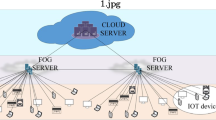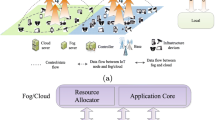Abstract
Fog computing has risen into a popular topic in recent years with the idea of deploying computation and communication closer to end-users. The capability of the fog model to face serious challenges like high latency and power consumption is of paramount research significance, notably in the context of the Internet of Things (IoT), given the volume and requirements of IoT applications. Accordingly, issues such as using the capacity of the fog layer maximally, minimizing latency while maintaining reliability, and efficiently distributing the workload across the network can be well explored. This motivated us to propose a scheme for partial computation offloading and resource allocation in the fog-based IoT network with the goal of optimizing latency and power consumption (ROGI). In this research, the nodes in all network layers are involved in processing the workload. Also, the power consumption in the end-users layer is reduced. Additionally, the fog nodes collaborate to improve system reliability and provide more resources for handling users’ requests. Furthermore, the concept of partial offloading is adopted, which would potentially lead to higher flexibility in resource management and provide the opportunity to leverage more resources in each layer of IoT architecture. Moreover, the whole model is decomposed into three problems, each of which is solved via optimization techniques. Extensive simulations are carried out to show the performance of the proposed scheme.







Similar content being viewed by others
Availability of data
The data supporting the findings of this study are generated in our simulations, in which some variables are static and some follow probability distributions. We explained all the information needed to replicate the simulations in the section “Performance Evaluation.”
References
Gu, L., Zeng, D., Guo, S., Barnawi, A., Xiang, Y.: Cost efficient resource management in fog computing supported medical cyber-physical system. IEEE Trans. Emerg. Top. Comput. 5, 108–119 (2017). https://doi.org/10.1109/TETC.2015.2508382
Camhi, J.: Former Cisco CEO john chambers predicts 500 billion connected devices by 2025. Business Insider. https://www.businessinsider.com/former-cisco-ceo-500-billion-connected-devices-by-2025-2015-11 (2015). Accessed 17 Aug 2020
Alippi, C., Fantacci, R., Marabissi, D., Roveri, M.: A cloud to the ground: the new frontier of intelligent and autonomous networks of things. IEEE Commun. Mag. 54, 14–20 (2016). https://doi.org/10.1109/MCOM.2016.1600541CM
Mondal, S., Das, G., Wong, E.: Cost-optimal cloudlet placement frameworks over fiber-wireless access networks for low-latency applications. J. Netw. Comput. Appl. 138, 27–38 (2019). https://doi.org/10.1016/j.jnca.2019.04.014
Mukherjee, M., Shu, L., Wang, D.: Survey of fog computing: fundamental, network applications, and research challenges. IEEE Commun. Surv. Tutorials. 20, 1826–1857 (2018). https://doi.org/10.1109/COMST.2018.2814571
Keshavarznejad, M., Rezvani, M.H., Adabi, S.: Delay-aware optimization of energy consumption for task offloading in fog environments using metaheuristic algorithms. Cluster Comput. 24, 1825–1853 (2021). https://doi.org/10.1007/s10586-020-03230-y
Shi, W., Cao, J., Zhang, Q., Li, Y., Xu, L.: Edge computing: vision and challenges. IEEE Internet Things J. 3, 637–646 (2016). https://doi.org/10.1109/JIOT.2016.2579198
Fan, Q., Ansari, N.: application aware workload allocation for edge computing-based IoT. IEEE Internet Things J. 5, 2146–2153 (2018). https://doi.org/10.1109/JIOT.2018.2826006
Paul, D., Zhong, W.-D., Bose, S.K.: Energy efficiency aware load distribution and electricity cost volatility control for cloud service providers. J. Netw. Comput. Appl. 59, 185–197 (2016). https://doi.org/10.1016/j.jnca.2015.08.012
Shao, Y., Li, C., Fu, Z., Jia, L., Luo, Y.: Cost-effective replication management and scheduling in edge computing. J. Netw. Comput. Appl. 129, 46–61 (2019). https://doi.org/10.1016/j.jnca.2019.01.001
Lin, J., Yu, W., Zhang, N., Yang, X., Zhang, H., Zhao, W.: A survey on internet of things: architecture, enabling technologies, security and privacy, and applications. IEEE Internet Things J. 4, 1125–1142 (2017). https://doi.org/10.1109/JIOT.2017.2683200
Pan, J., McElhannon, J.: Future edge cloud and edge computing for internet of things applications. IEEE Internet Things J. 5, 439–449 (2018). https://doi.org/10.1109/JIOT.2017.2767608
Naha, R.K., Garg, S., Georgakopoulos, D., Jayaraman, P.P., Gao, L., Xiang, Y., Ranjan, R.: Fog computing: survey of trends, architectures, requirements, and research directions. IEEE Access. 6, 47980–48009 (2018). https://doi.org/10.1109/ACCESS.2018.2866491
Mouradian, C., Naboulsi, D., Yangui, S., Glitho, R.H., Morrow, M.J., Polakos, P.A.: A comprehensive survey on fog computing: state-of-the-art and research challenges. IEEE Commun. Surv. Tutorials. 20, 416–464 (2018). https://doi.org/10.1109/COMST.2017.2771153
Shukla, S., Hassan, M.F., Tran, D.C., Akbar, R., Paputungan, I.V., Khan, M.K.: Improving latency in Internet-of-Things and cloud computing for real-time data transmission: a systematic literature review (SLR). Cluster Comput. (2021). https://doi.org/10.1007/s10586-021-03279-3
Shahryari, O.-K., Pedram, H., Khajehvand, V., TakhtFooladi, M.D.: Energy-efficient and delay-guaranteed computation offloading for fog-based IoT networks. Comput. Netw. 182, 107511 (2020). https://doi.org/10.1016/j.comnet.2020.107511
Fersi, G.: Fog computing and Internet of Things in one building block: a survey and an overview of interacting technologies. Cluster Comput. 24, 2757–2787 (2021). https://doi.org/10.1007/s10586-021-03286-4
Xiao, Y., Krunz, M.: Distributed optimization for energy-efficient fog computing in the tactile internet. IEEE J. Sel. Areas Commun. 36, 2390–2400 (2018). https://doi.org/10.1109/JSAC.2018.2872287
Baranwal, G., Vidyarthi, D.P.: FONS: a fog orchestrator node selection model to improve application placement in fog computing. J. Supercomput. 77, 10562–10589 (2021). https://doi.org/10.1007/s11227-021-03702-x
Liu, L., Chang, Z., Guo, X., Mao, S., Ristaniemi, T.: Multiobjective optimization for computation offloading in fog computing. IEEE Internet Things J. 5, 283–294 (2018). https://doi.org/10.1109/JIOT.2017.2780236
Liu, L., Chang, Z., Guo, X.: Socially aware dynamic computation offloading scheme for fog computing system with energy harvesting devices. IEEE Internet Things J. 5, 1869–1879 (2018). https://doi.org/10.1109/JIOT.2018.2816682
Lee, G., Saad, W., Bennis, M.: An online optimization framework for distributed fog network formation with minimal latency. IEEE Trans. Wirel. Commun. 18, 2244–2258 (2019). https://doi.org/10.1109/TWC.2019.2901850
Xiao, Y., Krunz, M.: QoE and power efficiency tradeoff for fog computing networks with fog node cooperation. In: Proceedings of the IEEE INFOCOM (2017). https://doi.org/10.1109/INFOCOM.2017.8057196
Bozorgchenani, A., Member, S., Tarchi, D., Member, S., Corazza, G.E., Member, S.: Centralized and distributed architectures for energy and delay efficient fog network based edge computing services. IEEE Trans. Green Commun. Netw. (2018). https://doi.org/10.1109/TGCN.2018.2885443
Ning, Z., Dong, P., Kong, X., Xia, F.: A cooperative partial computation offloading scheme for mobile edge computing enabled internet of things. IEEE Internet Things J. 6, 4804–4814 (2019). https://doi.org/10.1109/JIOT.2018.2868616
Bi, J., Yuan, H., Zhang, K., Zhou, M.: Energy-minimized partial computation offloading for delay-sensitive applications in heterogeneous edge networks. IEEE Trans. Emerg. Top. Comput. 6750, 1–13 (2022). https://doi.org/10.1109/TETC.2021.3137980
Mao, Y., You, C., Zhang, J., Huang, K., Letaief, K.B.: A survey on mobile edge computing: the communication perspective. IEEE Commun. Surv. Tutorials 19, 2322–2358 (2017). https://doi.org/10.1109/COMST.2017.2745201
Shakarami, A., Ghobaei-Arani, M., Shahidinejad, A.: A survey on the computation offloading approaches in mobile edge computing: a machine learning-based perspective. Comput. Netw. 182, 107496 (2020). https://doi.org/10.1016/j.comnet.2020.107496
Sarkar, S., Chatterjee, S., Misra, S.: Assessment of the suitability of fog computing in the context of internet of things. IEEE Trans. Cloud Comput. 6, 46–59 (2018). https://doi.org/10.1109/TCC.2015.2485206
Deng, R., Lu, R., Lai, C., Luan, T.H., Liang, H.: Optimal workload allocation in fog-cloud computing toward balanced delay and power consumption. IEEE Internet Things J. 3, 1171–1181 (2016). https://doi.org/10.1109/JIOT.2016.2565516
Zhang, H., Xiao, Y., Bu, S., Niyato, D., Yu, F.R., Han, Z.: Computing resource allocation in three-tier IoT fog networks: a joint optimization approach combining Stackelberg game and matching. IEEE Internet Things J. 4, 1204–1215 (2017). https://doi.org/10.1109/JIOT.2017.2688925
Wang, K., Wang, Y., Sun, Y., Guo, S., Wu, J.: Green industrial internet of things architecture: an energy-efficient perspective. IEEE Commun. Mag. 54, 48–54 (2016). https://doi.org/10.1109/MCOM.2016.1600399CM
Yang, Y., Zhao, S., Zhang, W., Chen, Y., Luo, X., Wang, J.: DEBTS: delay energy balanced task scheduling in homogeneous fog networks. IEEE Internet Things J. 5, 2094–2106 (2018). https://doi.org/10.1109/JIOT.2018.2823000
Wang, Y., Sheng, M., Wang, X., Wang, L., Li, J.: Mobile-edge computing: partial computation offloading using dynamic voltage scaling. IEEE Trans. Commun. 64, 4268–4282 (2016). https://doi.org/10.1109/TCOMM.2016.2599530
Yang, S., Li, F., Shen, M., Chen, X., Fu, X., Wang, Y.: Cloudlet placement and task allocation in mobile edge computing. IEEE Internet Things J. 6, 5853–5863 (2019). https://doi.org/10.1109/JIOT.2019.2907605
Xiao, Y., Krunz, M.: Dynamic network slicing for scalable fog computing systems with energy harvesting. IEEE J. Sel. Areas Commun. 36, 2640–2654 (2018). https://doi.org/10.1109/JSAC.2018.2871292
Wang, C., Liang, C., Yu, F.R., Chen, Q., Tang, L.: Computation offloading and resource allocation in wireless cellular networks with mobile edge computing. IEEE Trans. Wirel. Commun. 16, 4924–4938 (2017). https://doi.org/10.1109/TWC.2017.2703901
Yao, J., Ansari, N.: QoS-aware fog resource provisioning and mobile device power control in IoT networks. IEEE Trans. Netw. Serv. Manag. 16, 167–175 (2019). https://doi.org/10.1109/TNSM.2018.2888481
Kleinrock, L.: Queueing Systems. 2: Computer Applications. Wiley, New York (1976)
Garey, M.R., Johnson, D.S.: Computers and Intractability: A Guide to the Theory of NP-Completeness (Series of Books in the Mathematical Sciences). W.H. Freeman, San Francisco (1979)
Oommen, B.J., Roberts, T.D.: Continuous learning automata solutions to the capacity assignment problem. IEEE Trans. Comput. 49, 608–620 (2000). https://doi.org/10.1109/12.862220
Sykas, E.D.: On the capacity assignment problem in packet-switching computer networks. Appl. Math. Model. 10, 346–356 (1986). https://doi.org/10.1016/0307-904X(86)90094-6
Kaur, M., Aron, R.: A systematic study of load balancing approaches in the fog computing environment. J. Supercomput. 77, 9202–9247 (2021). https://doi.org/10.1007/s11227-020-03600-8
Boyd, S., Vandenberghe, L.: Convex Optimization. Cambridge University Press, Cambridge (2004)
Löfberg, J.: Modeling and solving uncertain optimization problems in YALMIP. IFAC Proc. 41, 1337–1341 (2008). https://doi.org/10.3182/20080706-5-KR-1001.00229
Grant, M., Boyd, S.: CVX: Matlab software for disciplined convex programming, version 2.0 beta. http://cvxr.com/cvx (2013)
Fan, Q., Ansari, N.: Workload allocation in hierarchical cloudlet networks. IEEE Commun. Lett. 22, 820–823 (2018). https://doi.org/10.1109/LCOMM.2018.2801866
Zhang, J., Hu, X., Ning, Z., Ngai, E.C.H., Zhou, L., Wei, J., Cheng, J., Hu, B.: Energy-latency tradeoff for energy-aware offloading in mobile edge computing networks. IEEE Internet Things J. 5, 2633–2645 (2018). https://doi.org/10.1109/JIOT.2017.2786343
Lu, S., Wu, J., Duan, Y., Wang, N., Fang, Z.: Cost-efficient resource provisioning in delay-sensitive cooperative fog computing. In: Proceedings of the International Conference Parallel Distributed Systems—ICPADS. 2018-December, pp. 706–713 (2019). https://doi.org/10.1109/PADSW.2018.8644626
Mao, Y., Zhang, J., Song, S.H., Letaief, K.B.: Power-delay tradeoff in multi-user mobile-edge computing systems. In: 2016 IEEE Global Communications Conference GLOBECOM 2016—Proceedings (2016). https://doi.org/10.1109/GLOCOM.2016.7842160
Dinh, T.Q., Tang, J., La, Q.D., Quek, T.Q.S.: Offloading in mobile edge computing: task allocation and computational frequency scaling. IEEE Trans. Commun. 65, 3571–3584 (2017). https://doi.org/10.1109/TCOMM.2017.2699660
Funding
The authors received no specific funding for this work.
Author information
Authors and Affiliations
Contributions
All authors contributed to the design and implementation of the research, to the analysis of the results and to the writing of the manuscript.
Corresponding author
Ethics declarations
Conflict of interest
The authors have no conflict of interest to report.
Ethical statement
This article does not contain any studies involving human or animal subjects.
Additional information
Publisher's Note
Springer Nature remains neutral with regard to jurisdictional claims in published maps and institutional affiliations.
Rights and permissions
Springer Nature or its licensor holds exclusive rights to this article under a publishing agreement with the author(s) or other rightsholder(s); author self-archiving of the accepted manuscript version of this article is solely governed by the terms of such publishing agreement and applicable law.
About this article
Cite this article
Tabarsi, B.T., Rezaee, A. & Movaghar, A. ROGI: Partial Computation Offloading and Resource Allocation in the Fog-Based IoT Network Towards Optimizing Latency and Power Consumption. Cluster Comput 26, 1767–1784 (2023). https://doi.org/10.1007/s10586-022-03710-3
Received:
Revised:
Accepted:
Published:
Issue Date:
DOI: https://doi.org/10.1007/s10586-022-03710-3





